
By Deidre Montague
NABJ Monitor
The NABJ officer elections for 2021 feature a contest for the top position. Manuel Smith is challenging current President Dorothy Tucker for the job. Other positions being voted on this year have a single candidate. The candidates laid out their positions in interviews with the NABJ Monitor. Here is where they stand:
President
Dorothy Tucker
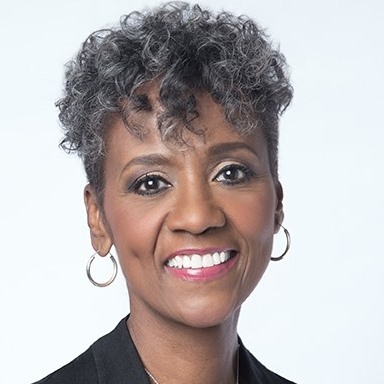
Dorothy Tucker
NABJ President Candidate
Dorothy Tucker, who is running for a second term, says her proudest accomplishments include providing COVID-19 relief funding for furloughed members and hosting additional educational webinars to keep members connected to the organization. She talked about the excitement she felt seeing members engage in the webinars.
“We tripled the number of webinars, and we went from having only a handful of webinars a year to having more than 50,” she said, adding that hundreds of members signed up. Webinars on how to negotiate salary and becoming a manager each drew hundreds of people. ”That was exciting to me. And I really felt good that our members still supported this organization with enthusiasm.”
COVID-19 relief funds for members in need also made a big difference, she said.
“There were times when I would hear from members. And it really brought tears to my eyes, you know, what they were going through, and how much they were suffering,” she said. “These are people who’ve never been laid off in their lives. And so for this organization to be able to say, take this $250 take this $500 take this $2,000 … All you have to do is tell us what you needed it for. … It feels good to know that we were able to respond to our members in a time of need.”
Some of the new initiatives that she plans to launch are the NABJ Media Network and expanding programming on behalf of entrepreneurs.
The NABJ Media Network would be a news service to hire freelance reporters and create content to sell and bring in revenue for the organization, she said.
“We already have a number of partners who are excited about joining us,” she said.
The programming for entrepreneurs will include a 10-week free program in September to teach members how to scale their business up, focus on their brands and increase their revenue. It also will reach out to aspiring entrepreneurs, she said.
For her second term, Tucker has a more systemic focus, where she plans to work to address the racial inequities within the journalism industry and increase membership numbers within the organization.
“One of the things that we see in this industry is that quite honestly, there are so many black journalists working in digital and print and broadcast and podcasts, and they are not paid the same salaries as our white counterparts,” she said “This is not right. What can we do to correct this and make sure that going forward and currently, we change this and we make sure that our members who are doing the same jobs have the same pay and have access to the same kind of raises and money? It is something that really disturbs me.”
Her strategy for increasing membership is to relaunch the “Each One, Reach One” program, where she planned to have financial initiatives for current members to both renew their memberships and bring in new members. However, COVID-19 derailed those plans.
One of her last new projects Tucker plans to present is a report card on America’s newsroom, where she plans to discover what the top jobs are within the journalism field and document how many people of color are being hired into these roles.
“I want to do a report card,” she said. “I want to know how many promotions there have been for people of color. … I want to do a full assessment on it.”
Manuel Smith
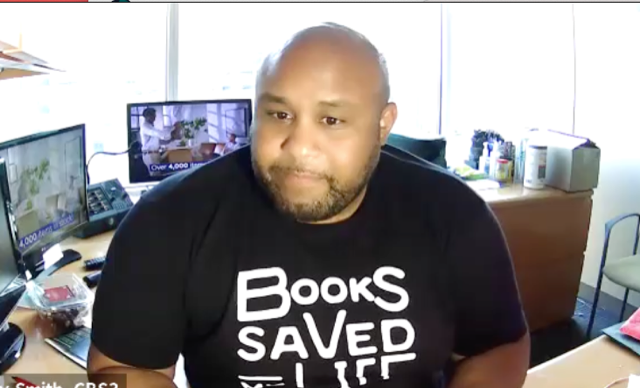
Manuel Smith
NABJ President Candidate
Manuel Smith, who is challenging Tucker, is the managing editor at CBS 3 in Philadelphia, where he focuses on content and coverage. He is the immediate past president for the Philadelphia Association of Black Journalists, and he plans to draw on that experience to lead the national organization.
As president of PABJ, he focused on “high quality, actionable training that people can use to develop and engage in their careers right away,” he said. The training reached not only young journalists who were new and needed the skills, but also experienced journalists who wanted to update their skills, he said.
“That’s how we’re able to elevate and level the playing field for all,” Smith said. He worked on the Fox News national desk for seven years, where he had the opportunity to cover major stories, which included covering 9/11 for two weeks as a field producer. He was a senior video journalist at News Corp. and was a part of overseeing digital works of the Wall Street Journal and the New York Post when it was one company.
This experience, along with his personal story of coming into journalism in high school, was the inspiration for running for NABJ president.
Smith came to journalism through detention in high school. The detention sponsor was also the newspaper club adviser and recruited Smith.
“It wasn’t really until that point that I realized that hey, the way I like to be part of the information circle, but the way that I could use getting information and asking good questions on behalf of my community really appealed to me in a lot of different ways,” he said. “And so when you ask me why I’m motivated to lead, especially in the NABJ / PMBJ universe, it’s because of that.”
While Smith plans to focus on mid-level journalists, he also says that he will not forget about entry-level and students, or veteran journalists. He says that while NABJ does a great job providing opportunities for students and early career journalists, the opportunities are not as plentiful for those journalists who are in mid-career within the organization.
“What I’m saying to students is … I can see where you want to be. And here’s a plan on how NABJ is going to help you to get there,” he said. “And then for those folks who want to go from the mid-career into the senior career, “Hey, here is where now I’m in my profession. Here’s how I sharpen that tool.”
Smith distinguishes himself from his opponent, Tucker, by saying that he is member-focused. One of the ways that he intends to demonstrate this, if elected, is by initiating a membership drive for NABJ’s 50th anniversary, to not only drive new membership, but also to encourage previous members to return and renew their memberships.
“The Welcome Home campaign will encourage members who have not renewed in a couple of years and other people who sit on the sidelines of NABJ and not participate, because there is an overall sense of a lot of people who don’t actively participate in the organization,” he said. It will include discounts on membership renewals.
Lastly, Smith has plans to make sure that LGBTQ+ members voices’ are heard and uplifted.
“I don’t think they feel particularly happy with the efforts that have been done already. They don’t feel like NABJ is whole to them or that it feels like a much safer place. And so one workshop doesn’t answer that.
He said his experience with a similar incident at PABJ has prepared him to address the issue.
“The fact that you even need to have a sensitivity workshop and the fact that ‘Hey, we did one workshop. And that solves the problem.’ I think, to me, I really disagree with Dorothy on that level, like, hey, that’s not solving a problem. That doesn’t make you a champion of the community by doing just one workshop. That’s not a holistic way to look at that issue. And it’s certainly not making things better for people in the future.”
Vice President of Broadcast
Ken Lemon
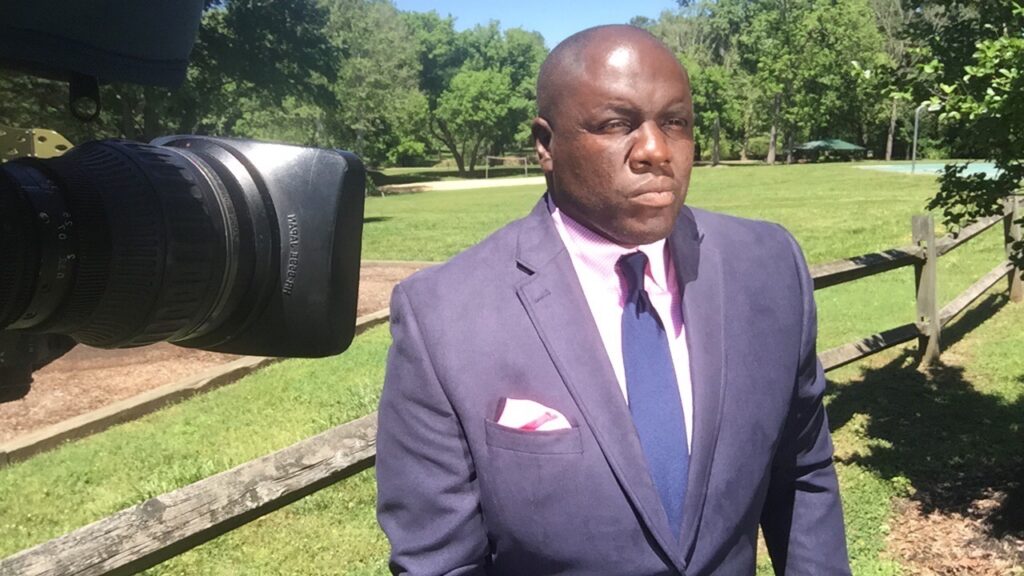
Ken Lemon
NABJ VP of Broadcast
Candidate
Ken Lemon is a reporter for WSC-TV in Charlotte, North Carolina. He started his journalism career in Myrtle Beach, South Carolina, and then returned home to work in Wilmington, North Carolina.
Throughout his journalism career, he has been a part of three Emmy Award-winning teams and has won the Edward R. Murrow Award, a couple of AP awards and several other awards. Lemon is a founding member of the reestablished Charlotte Area Association of Black Journalists, where he has served on the board, including two terms as president.
He has served for two years as a chairman of the Council of Presidents, which works with 79 professional chapters and several student chapters to build stronger chapters for NABJ. He was also a deputy director for NABJ’s Region III, which had two successful regional conventions under his term.
Lemon is proud of being the primary chairman for the Black Male Media Project, the Hurricane Relief Fund, and most recently, The COVID Relief Fund. He also was a part of the advocacy efforts that the NABJ board took on.
Lemon notes the advocacy NABJ did taking on ABC News after executive Barbara Fedida made racially insensitive remarks, challenging CBS News after Peter Dunn and David Friend after they were accused of creating a hostile work environment and calling out the lack of diversity in the Hollywood Foreign Press Association
“We said, ‘Look, things have got to change, top to bottom. Things have got to change,” Lemon said. “We need to take a look at the way you’re doing things because it’s not equitable.”
And after changes were made, he said, NABJ told individuals, “We’re going to be here until it changes.”
As a result, he said, “We have people who can return to newsrooms where they feel respected, where there’s opportunity provided for Black journalists, not just in the newsroom, but in decision making news positions at the top.”
Vice President of Digital
Amir Vera

Amir Vera
NABJ VP of Digital
Candidate
Hailing from Virginia, Amir Vera attended Virginia Commonwealth University in Richmond, Virginia. His journalism career began at the Progress Index in Petersburg, Virginia, where he was one of three reporters covering two localities and other assigned stories. He later moved on to the Virginian Pilot in Norfolk, Virginia, where he was the online and breaking news reporter. And then through NABJ, he received his current job at CNN, where he started out as an associate writer, and is now a writer.
One of the key reasons Vera is running is to define “digital” for the organization. He believes that NABJ needs to now ensure its own digital branch within the organization.
“I think the issue with NABJ is that nobody really knows what digital is. So that’s why I’m running,” he said. “I want to be an advocate for our digitally-minded members so that we can get more diversity in the digital space.”
Vera wants to increase the workshops, webinars and other activities that embrace the digital space. He also plans to partner with other organizations such as AAJA, NAHJ or ONA and different companies that he believes will help NABJ in the future.
Vera also plans to be accessible to all, especially student journalists.
“I’m a big proponent of speaking to students and outreach to students and everything like that, because that’s how I got to where I am,” he said. “I plan to work with the Digital Task Force and the Young Journalist Taskforce heavily to get more young people involved.”
Secretary
Madison Carter
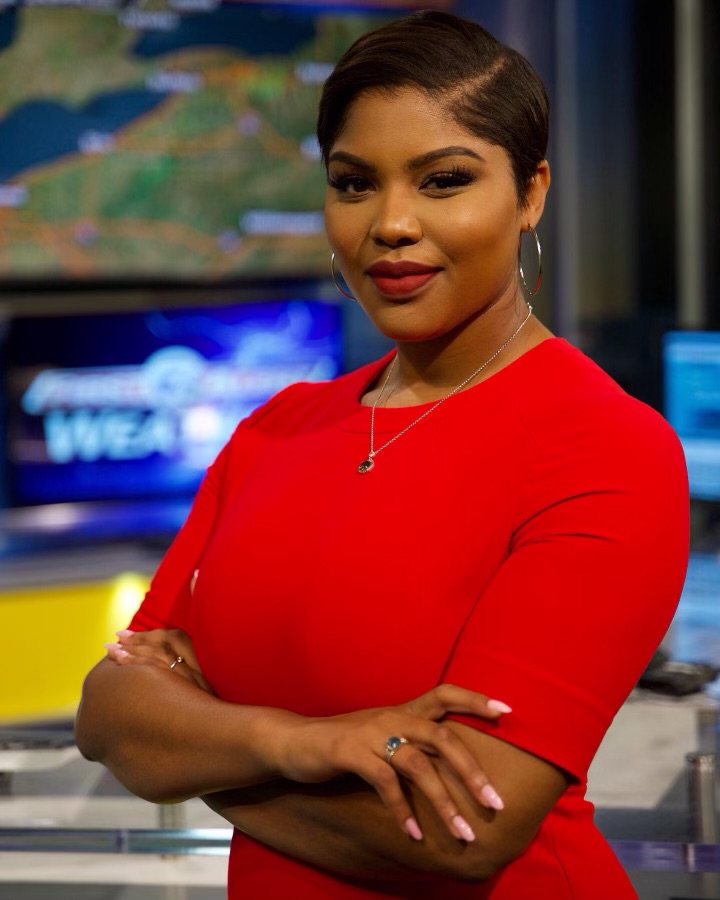
Madison Carter
NABJ Secretary
Candidate
Madison Carter is an investigative national reporter for Atticus at 11 Alive News in Atlanta, where she produces long-form documentary-style investigations on national topics.
After attending Syracuse University, Carter started her journalism career in Charlottesville, Virginia, where she covered the “Unite The Right” rally. She then moved to Buffalo, New York, where she increased her advocacy for Black journalists.
She became the second president of the Buffalo Association of Black Journalists in its 20-year history.
Her experience with BABJ inspired her to want to take her leadership skills to the national level as NABJ secretary.
“I decided to run for secretary because I know how important this role is to the functioning of the board. From being president, I know how important the records are, I know how important it is to know who said what, when, and where, because everybody has a different idea of what actually happened in the meetings, and then also just bringing more transparency to our general body, for NABJ.”,
Carter also wants to bring her experience in advocacy in Buffalo to the national board.
“I’m really big on advocacy,” she said. “I want to have a seat at the table for those big meetings and be a part of creating change for newsrooms across the country.”
Carter plans to make the minutes accessible to all members and use social media platforms to keep them informed about what is going on.
“I went to go look at the minutes just to see what’s the format. They’re very difficult to find,” she said. “So I think using those resources that we have to distribute information, that’s my first plan to say, hey, all the information that’s public, I want you to know exactly what your board was doing.”
Carter also wants to empower local NABJ chapters to build their advocacy efforts.
“We see a lot of it coming from national, but I know from being a local president, national’s trying to empower our local chapters to do some of that work,” she said. “So I’m also going to be part of that team, I hope.”
Carter said her experience has made her ready for this national position.
“I have a long proven track record since the day I stepped into this industry, of advocating for Black journalists, not just myself, but putting myself in a line of fire to fight for us,” she said. “And I want to be able to do that on the national level. I want to be a voice for you. I want to be an access point for you to the national chapter.”
Region I Director
Brie Jackson
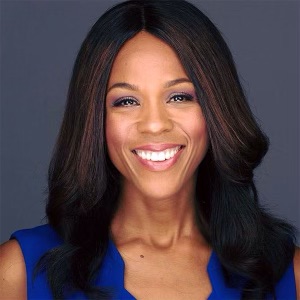
Brie Jackson
NABJ Region I Director
Candidate
Brie Jackson began her journalism career on-air at WBOC in Salisbury, Maryland. She then moved to South Carolina, to Roanoke, Virginia, and has been working in Washington D.C. for the past five years covering politics. She covered all four years of the Trump administration and is now covering the first year of President Biden’s administration.
Jackson wants to give back to the organization that has helped her throughout her career.
“I wanted to … find a way to get more involved to help others and be the person that I had in the field, being like a mentor that I had, but also be the person that maybe I wish I would have had and didn’t know that I needed at the time,” she said.
The major news stories of the year, the pandemic and police-involved shootings, also pushed her to run.
“It was a really tough year for Black people in particular, and then also for Black journalists covering those stories,” she said. “So for me, it was just the moment where I said, What can I do to help others in this field? So that’s why I decided to run now.”
She hopes NABJ members in Region 1 will vote for her, even though she is running unopposed.
“It’s a way to hold me accountable,” she said. “So, when we’re having conversations, when we meet in person, you can say, ‘Hey, I voted for you. Here’s what I expect from you.”
“It gives me a sense of, you know, I’m being held accountable for the people I’d like to help.”
Region III Director
Eva Coleman
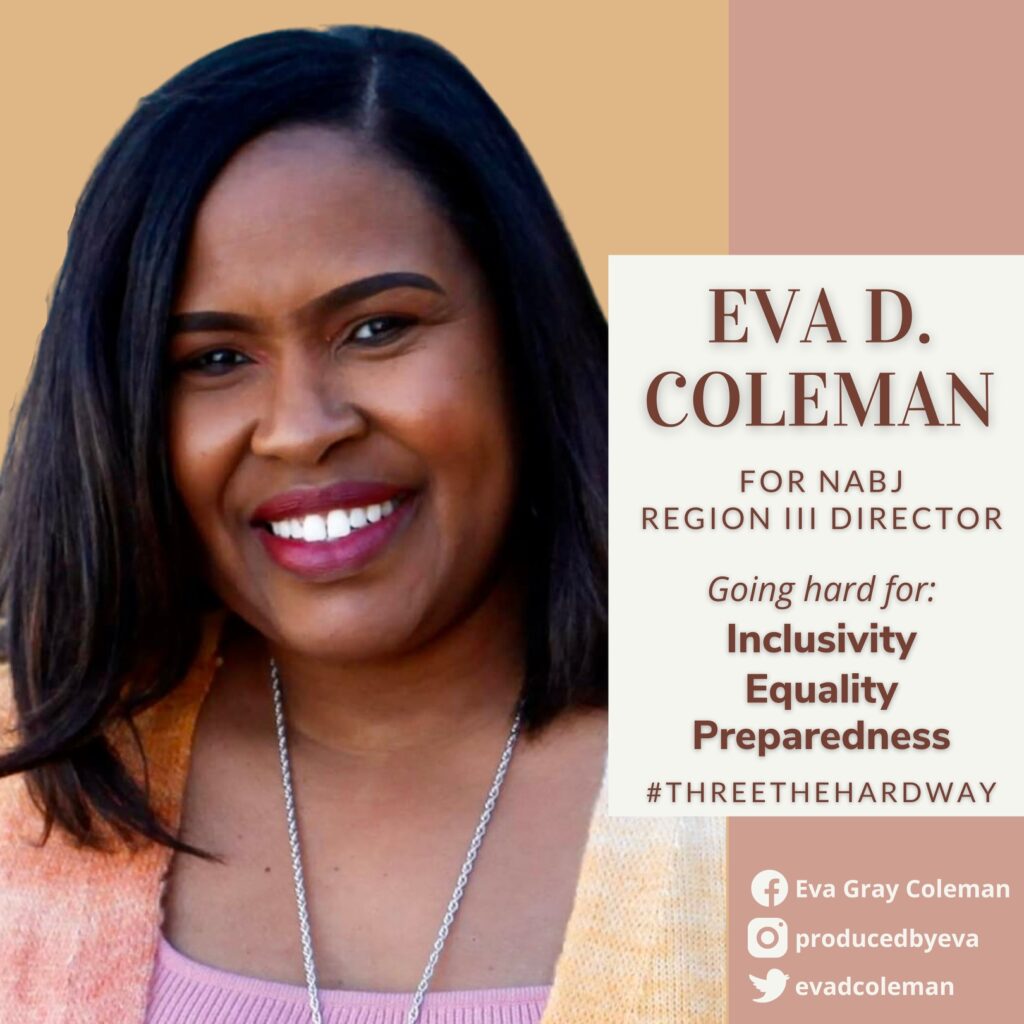
Eva Coleman
NABJ Region III Director Candidate
Eva Coleman has been a professional in Dallas-Fort Worth, Texas, for over 27 years. She has experience in radio, television, newspaper, and education. Currently, she is the lifestyle and culture editor for I Messenger Media, which has three different newspaper publications: I Messenger, Texas Metro News, and The Garland Journal.
She also works with youth at Frisco Independent School District, one of the fastest-growing school districts, starting television programs on three different campuses. At Collin College, she is a part-time adjunct professor for the video production course and oversees curriculum development and the implementation of directing of film and video.
She has completed two terms as president of the Dallas Fort Worth Association of Black Journalists in 1999 and 2000, and now is the chapter’s president again. In 2018 she was appointed by former President Sarah Glover to chair the NABJ national convention in Detroit, and she co-chaired the NABJ convention in Miami the following year. She was named the NABJ National Educator of the Year in 2019.
Coleman wants to connect with the leadership of all the chapters within her region to hear their issues, concerns, and what they like about being in NABJ. She also plans to reach out to college campus leadership for NABJ chapters.
“I want to make sure that all of the programming that comes down the pike from NABJ is adequately shared to every single chapter, and in a timely manner,” she said. “I want there to be this conduit where chapters are sending in their kudos and their high fives and their promotional things, to where we can share it throughout the region.”
The experience with virtual over the past two years has made it possible to share even faster, she said.
Like Jackson, Coleman encourages members to vote her into this position, even though she is unopposed.
“Checking the box for me as Region III director gives me your vote of confidence that you trust me in leading us in this effort,” she said. “I’m counting on me to be the voice of our region. … And I want to make sure and know that you’re counting on me too.”
Student Representative
Tamia Fowlkes
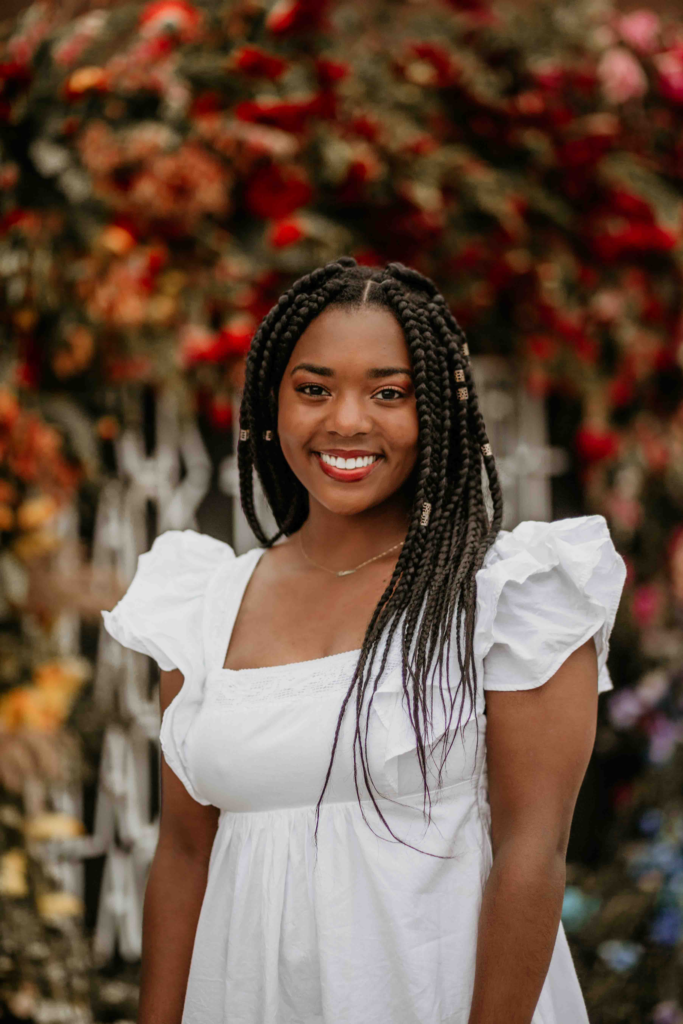
Tamia Fowlkes
NABJ Student Representative Candidate
Tamia Fowlkes is a rising senior at the University of Wisconsin-Madison majoring in journalism and political science. She is an investigative reporting intern at the Milwaukee Journal Sentinel.
A former student council representative on her college campus, she is running because she is passionate about representing students.
“I’ve worked a few nonpartisan voting jobs, which have really taught me a lot the importance of voting and having people representing that really do listen and care about the issues that matter most to the constituents they serve,” she said. “And so, I was just really excited to run and to open myself up to the opportunity to work with fellow board members.”
Fowlkes wants to make sure that student voices are heard, especially “to offer up the ideas that they have about this industry, the ways that it can change and the stories that we need to be telling, and present that to older audiences, and to also to the people in this industry, who should, you know, listen to them and uplift their ideas and their voices.”
She wants to reach out to student chapters with quarterly check-ins or social media check-ins ”just to gauge how people are feeling about the organization and what needs to be brought to make it more enjoyable and experience.”
Fowlkes hopes students take the time to vote.
“I think learning is key,” she said. “And I want to, you know, grant people opportunities to do just that, professional development opportunities, working opportunities, opportunities to write and to continue contributing to this organization in a way that we have never done before. And really create a student hub where ideas of young people and people who are in academic institutions are.”



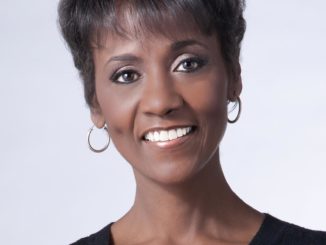
Be the first to comment